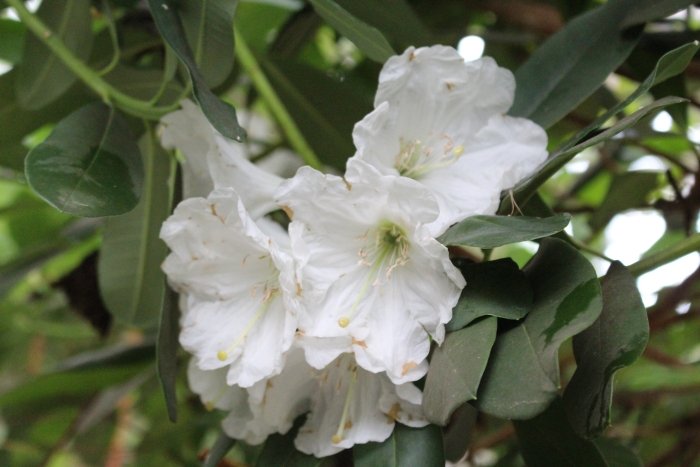Great White Rhododendron
(Rhododendron decorum)
Great White Rhododendron (Rhododendron decorum)
/
/

Misolonax
CC BY-SA 4.0
Image By:
Misolonax
Recorded By:
Copyright:
CC BY-SA 4.0
Copyright Notice:
Photo by: Misolonax | License Type: CC BY-SA 4.0 | License URL: https://creativecommons.org/licenses/by-sa/4.0 | Uploader: Misolonax | Publisher: Wikimedia Commons | Title: Rhododendron_decorum_ssp._diaprepes.jpg | Notes: {{Information |Description ={{en|1=Plumleaf azalea}} |Source ={{own}} |Author =[[User:Jsfouche|Jsfouche]] |Date = |Permission = |other_versions = }} [[Category:Rhododendron]] |


















Estimated Native Range
Summary
Rhododendron decorum, commonly known as the Great White Rhododendron, is an evergreen shrub or small tree in the Ericaceae family. It is native to the mountainous regions of Southwest China and Northeast Myanmar, where it thrives in mixed evergreen and deciduous forests, often on acidic, humus-rich soils. This species typically grows to 1–6 m (3.3–19.7 ft) in height, with leathery, oblong to elliptic leaves ranging from 5–19 cm in length and 3–11 cm in width. The Great White Rhododendron is celebrated for its large, fragrant flowers that appear in trusses from late spring to early summer. The blossoms are predominantly white with a pale pink tinge and feature a distinctive yellow throat, making them quite showy.
The Great White Rhododendron has earned the Royal Horticultural Society’s Award of Garden Merit for its ornamental value, particularly its striking flowers and evergreen foliage. It is commonly used in woodland gardens, as a specimen plant, or in shrub borders. While hardy to −20 °C (−4 °F), it requires protection from harsh winds. It prefers acidic soil rich in leaf mould and benefits from mulching to maintain soil moisture. Rhododendron decorum should be planted in part shade to avoid scorching the leaves, and it requires medium amounts of water with well-draining soil. Potential problems include pests such as vine weevil and diseases like powdery mildew and root rot. It is important to avoid waterlogged conditions and to provide adequate spacing to prevent fungal issues.CC BY-SA 4.0
The Great White Rhododendron has earned the Royal Horticultural Society’s Award of Garden Merit for its ornamental value, particularly its striking flowers and evergreen foliage. It is commonly used in woodland gardens, as a specimen plant, or in shrub borders. While hardy to −20 °C (−4 °F), it requires protection from harsh winds. It prefers acidic soil rich in leaf mould and benefits from mulching to maintain soil moisture. Rhododendron decorum should be planted in part shade to avoid scorching the leaves, and it requires medium amounts of water with well-draining soil. Potential problems include pests such as vine weevil and diseases like powdery mildew and root rot. It is important to avoid waterlogged conditions and to provide adequate spacing to prevent fungal issues.CC BY-SA 4.0
Plant Description
- Plant Type: Shrub
- Height: 10-20 feet
- Width: 6-5 feet
- Growth Rate: Moderate
- Flower Color: Pink, White
- Flowering Season: Spring
- Leaf Retention: Evergreen
Growth Requirements
- Sun: Part Shade
- Water: Medium
- Drainage: Medium
Common Uses
Bee Garden, Bird Garden, Butterfly Garden, Fragrant, Hummingbird Garden, Low Maintenance, Rabbit Resistant, Showy Flowers
Natural Habitat
Native to mixed evergreen and deciduous forests in mountainous regions of Southwest China and Northeast Myanmar
Other Names
Common Names:
Scientific Names: , Rhododendron decorum,
GBIF Accepted Name: Rhododendron decorum Franch.